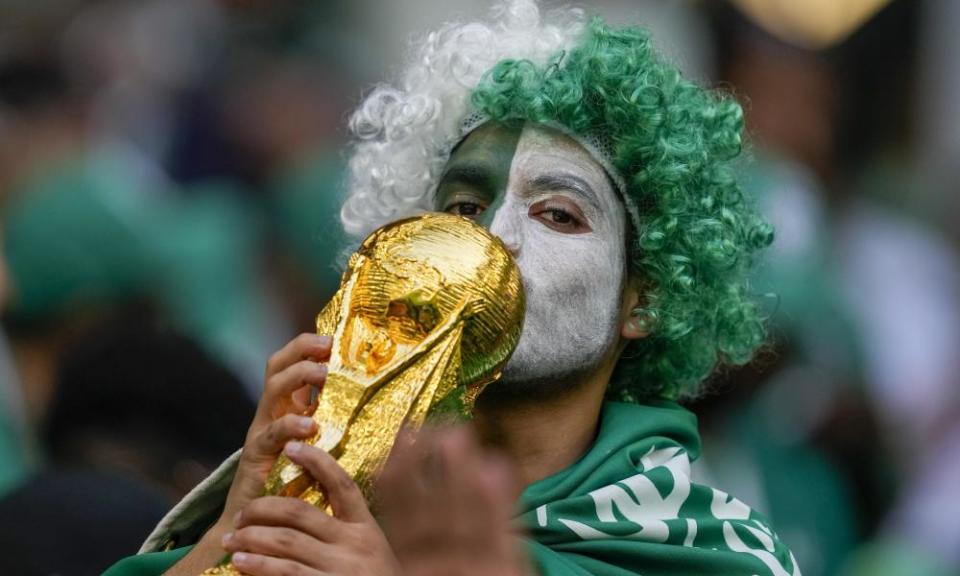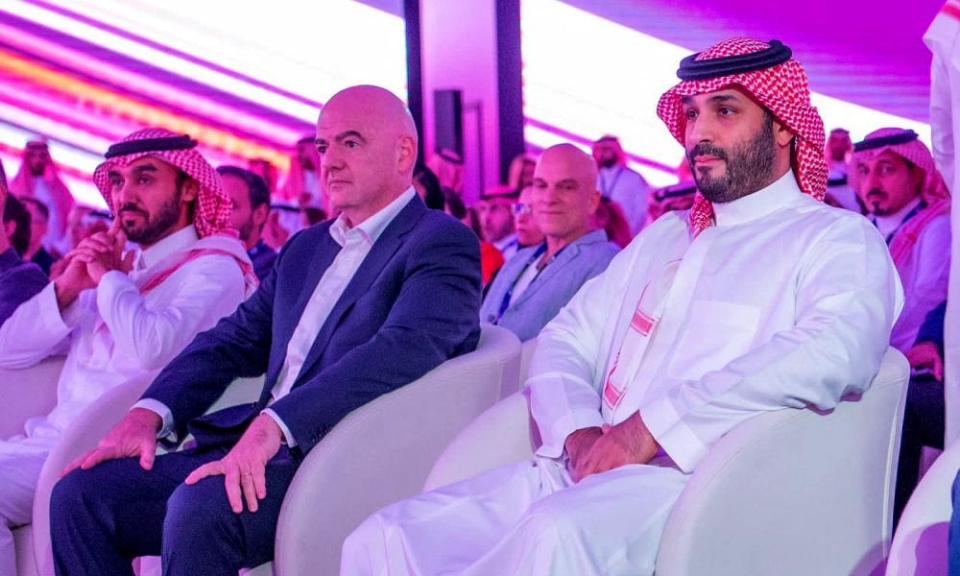Saudi Arabia’s clear path to World Cup shows power of Fifa and Infantino

The World Cup had not even finished in Qatar last winter before the question began to be asked: when would it be Saudi Arabia’s turn? Like a mist creeping in off the sea, from nowhere the conversation was suddenly ubiquitous and the outcome apparently inevitable. Now, not even a year later, we know the answer.
Saudi Arabia will host the Fifa men’s World Cup in 2034. Only the most unexpected or disastrous of circumstances will change that. Saudi Arabia, officially, has only ‘expressed an interest’ in being host to the 48-team tournament, but it stands in a field of one. It has the endorsement of the Asian Football Confederation and more than 100 Fifa member nations. Not insignificantly, it is also the apple of Gianni Infantino’s eye. The Fifa president was in Riyadh for the launch of an esports tournament last week, so great is his enthusiasm for sport in the country.
Related: Saudi Arabia confirmed as sole bidder for 2034 men’s World Cup
The manner in which Saudi Arabia earned its uncontested success caught people by surprise. A meeting of the Fifa council at the start of October had been expected to offer up something relatively mundane on the future of the international football calendar. Buried in item 4.6 of the agenda, though, was the topic “Bidding processes and hosting of the FIFA World Cup™”. What was put on the table was a new way of doing things, overturning rules on the timing of bids that had been put in place just a decade before and ensuring rotation of the tournament between all confederations, with Asia or Oceania guaranteed to host in 2034. These were changes which enabled Saudi Arabia not only to bid in confidence but to have its success confirmed almost immediately. Attendees at the meeting – the most senior administrators in football, including the president of Uefa and the chair of the English FA – had been made aware of the proposed changes just a week before. They were successfully voted through.
There has not been any public expression of discontent over the way this process was managed. The way Australia responded was instructive. It is long thought to have had ambitions to host the men’s World Cup in 2034, perhaps alongside Indonesia, but when presented with a 25-day expedited deadline to make its mind up, Football Australia – which competes as part of the Asian confederation – ultimately chose to stand down. Its chief executive, James Johnson, was accepting of the process. “It is what it is,” he said. Australia is understood to be leading the contenders to host Fifa’s ambitious new Club World Cup in 2029.
If recent events give the sense that football has fallen in line behind a desire to grant Saudi Arabia its wishes, then it wouldn’t be the first time that talk of values – in transparency and accountability as much as thornier topics such as the protection of human rights – has come up short against the reality of the beautiful game. But it also shows that, in accordance with Infantino’s ambitions, football is at last becoming a truly global sport.

The old powers of football were given an awakening at the World Cup in Qatar. Attempts to impose a set of European values on the tournament were rejected – from the bans on beer to the more sinister refusal to accept the rainbow flag as a symbol of solidarity with LGBTQ+ people. Now the World Cup is returning in short order to the Gulf and to Saudi Arabia, where homosexuality is illegal and political dissent punishable by death. There will be much scrutiny on how European nations, with England foremost among them, approach the tournament and whether they choose to engage on the issues. European leagues are also likely to have to accept the disruption of another winter World Cup. For countries elsewhere, many of whom have signed memorandums of understanding with the Saudi Football Federation that have benefited their resources and development, the outcome will be a sign of a welcome shift in the orbit of influence.
For Fifa and perhaps football more broadly there is now the prospect of an extensive infusion of Saudi investment on the back of the World Cup, whether through sponsorship or more MOUs. The question being asked now by those who were reading the tea leaves in Doha last year, is: what does Saudi Arabia want from it all? The answer is that nobody knows. There is no doubt that the country has grand plans for sport, that they see it as a way to develop tourism and unite the nation. But they have so many interlocking plans, all with towering ambition, and each of them ultimately controlled by the desires of one man: the crown prince, Mohammed bin Salman.
Last month Prince Mohammed declared his enthusiasm for the process of sportswashing as long as it meant he could “increase my GDP by way of 1%”.
It has been many countries’ experience, however, that hosting a sporting mega-event is not the easiest way to boost the national exchequer. And Saudi Arabia has a lot of infrastructure to build (it has four stadiums of the 14 needed, even after Fifa reduced the minimum required to host). As a symbol of Saudi Arabia’s influence over the sporting world, the de facto confirmation of the World Cup is powerful. What it achieves beyond that remains to be seen.

